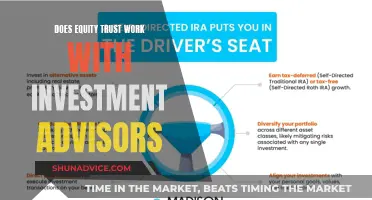
Finding the right person to help you invest is a crucial step in achieving your financial goals. Whether you're seeking help with budgeting, tax planning, or investment management, it's important to choose a qualified professional who suits your needs. Here are some key steps to guide you in this process:
- Identify your financial needs: Reflect on what you want from the relationship. Do you need assistance with budgeting, tax planning, or investment advice? Different advisors specialise in various areas, so knowing your requirements will help you find the right fit.
- Understand the types of financial advisors: Financial advisors go by many names, including investment advisors, brokers, certified financial planners, and more. It's important to understand the different types and their qualifications to ensure you're working with someone trustworthy.
- Review your options: Financial advisors are available in various forms, such as robo-advisors, online financial planning services, and traditional advisors. Consider your preferences, the services you need, and your budget when reviewing these options.
- Consider the cost: Financial advisors have different fee structures, including annual fees, subscription fees, or a percentage of your assets under management. Choose an advisor whose fees align with your budget and the level of guidance you require.
- Vet the advisor's background: Always verify the advisor's credentials and experience. Check their Form ADV, review their employment record, and look for any disciplinary issues.
- Hire the financial advisor: If you're satisfied with the advisor's background and confident they meet your needs, you can proceed with the hiring process. This typically involves discussing your financial situation, receiving an engagement letter, and signing legal documents.
| Characteristics | Values |
|---|---|
| Qualifications | Investment professionals may hold a variety of professional designations and credentials. |
| Registration | Check if the individual and their firm are registered. |
| Experience | Ask about their experience working with people like you. |
| Disciplinary actions | Ask about any disciplinary actions, arbitration awards or customer complaints. |
| Investment philosophy | Ask if they or their firm have an overarching investment philosophy. |
| Investment products and services | Ask about the types of investment products and services they offer, as well as any products or services they don't offer. |
| Minimum account balances | Ask if they impose any minimum account balances on customers and what happens if your portfolio falls below the minimum. |
| Payment structure | Ask how they get paid, such as commissions, a percentage of assets, a flat or hourly fee, etc. |
| Financial goals | Articulate your financial goals and objectives, including your investing experience and risk tolerance. |
| Pressure | Avoid investment professionals who push you to invest quickly or refuse to provide information for careful consideration. |
| Cold calls | Be wary of unsolicited communications and exaggerated claims, and never send money based on a sales pitch or free lunch. |
What You'll Learn

Understand the different types of financial advisors
Financial advisors go by many names, and it can be challenging to navigate the different types and their specialisations. Here is an overview of some of the most common types of financial advisors.
Investment Advisors
An investment advisor is a person or company that provides investment advice and manages client portfolios. They can help clients select investments, rebalance their portfolio, or manage their entire investment portfolio. Investment advisors can be individuals or companies that employ investment advisors, known as Registered Investment Advisors (RIAs). RIAs are held to a fiduciary standard, meaning they are legally required to act in their clients' best interests.
Certified Financial Planner (CFP)
Financial advisors who are CFPs have undergone rigorous training and passed a certification exam. They offer a wide range of financial planning services, including budgeting, retirement planning, and estate planning. CFPs also have a fiduciary duty to their clients, meaning they must act in their clients' best interests.
Financial Consultant/Wealth Manager
Financial consultant and wealth manager are generic terms that do not require specific licenses or certifications. A financial consultant may offer financial planning services, while a wealth manager typically caters to high-net-worth individuals with holistic financial advice, including investment management, estate planning, and tax planning.
Broker-Dealer/Broker
A broker-dealer is an individual or company that buys and sells securities such as stocks, bonds, and mutual funds. They can act as a broker, buying and selling on behalf of clients, or as a dealer, trading for their own account. Brokers provide investment advice and often sell mutual funds, life insurance, and other financial products, earning commissions for these transactions.
Robo-Advisor
Robo-advisors are automated investment services that use algorithms to build and manage investment portfolios based on clients' goals, risk tolerance, and financial situation. They offer a low-cost, simplified approach to investment management, often with no or low account minimums.
Other Types
Other types of financial advisors include financial coaches, who focus on financial literacy and budgeting, and financial therapists, who combine behavioural therapy with financial coaching to improve clients' money mindset. Additionally, there are financial advisors who specialise in specific areas, such as insurance, debt counselling, and estate planning.
Starbucks: Worth Your Investment?
You may want to see also

Identify your financial needs
Identifying your financial needs is the first step in choosing a financial advisor. Before you start looking for the right advisor, reflect on what you're hoping to get out of that relationship. Financial advisors provide a wide range of services, so it's a good idea to know what you need help with before you begin your search. Some advisors may specialize in particular areas of finance, such as debt management or investment advice, while others may provide holistic help, guiding you on everything from savings goals to retirement and estate planning.
- Do you need help with budgeting?
- Do you want help with investing?
- Would you like to create a financial plan?
- Do you have savings goals you need help reaching?
- Do you need to get your estate plan in order or create a trust?
- Do you need help with taxes?
- Are you interested in holistic financial management?
Your answers to these questions will help you find the right type of financial advisor for your needs. It will also help you decide if you need an advisor at all. For example, if you only want assistance with investing, a robo-advisor can handle that for you for a minimal fee. On the other hand, if you have a complex financial life and multiple concerns, you may want to find an online or traditional financial advisor.
Smart Ways to Invest Your $50
You may want to see also

Vet the financial advisor's background
Vetting a financial advisor's background is a crucial step in ensuring that you're working with a qualified and trustworthy professional. Here are some detailed instructions to help you through the process:
Check Credentials and Licenses:
Before hiring a financial advisor, it's essential to verify their credentials and licenses. Look for certifications such as Certified Financial Planner (CFP), which indicates expertise in financial planning, or Chartered Financial Analyst (CFA), which demonstrates a strong foundation in investment analysis and portfolio management. You can also check their licenses by searching for them in regulatory databases. In the US, the Securities Industry Essentials (SIE) exam is an introductory-level test that ensures basic knowledge of the securities industry.
Use Regulatory Databases:
Utilize regulatory databases to research a financial advisor's background. In the US, the Financial Industry Regulatory Authority (FINRA) offers BrokerCheck, a tool that provides information on a broker's employment history, licensing, regulatory actions, arbitrations, and complaints. The Securities and Exchange Commission (SEC) also has an Investment Advisor Public Disclosure website, which offers insights into an advisor's professional background, conduct, registrations, employment history, and disciplinary events.
Review Employment History:
Reviewing a financial advisor's employment history can provide valuable insights into their experience and expertise. Check for stability in their career and look for any red flags, such as frequent job changes or disciplinary actions. This information is often available through regulatory databases like BrokerCheck.
Verify Disciplinary Actions and Complaints:
It's crucial to verify whether a financial advisor has any history of disciplinary actions, complaints, or customer disputes. This information is typically available through regulatory databases and can help you identify potential issues or unethical behaviour.
Check for Criminal Records:
Conduct an independent background check to ensure that the financial advisor does not have any criminal records. This step is essential to ensure the advisor's integrity and trustworthiness.
Seek Additional Credentials:
Look for financial advisors who have obtained additional credentials, such as a Certified Financial Planner (CFP) certification. CFPs are held to a fiduciary standard, which means they are legally and ethically committed to putting their clients' financial interests above their own.
Interview Multiple Advisors:
Don't hesitate to shop around and interview at least two to three financial advisors. This will allow you to compare their qualifications, expertise, communication styles, and ability to meet your financial needs.
Ask for Referrals:
Seek referrals from friends, family, or other trusted sources who have had positive experiences with financial advisors. Personal recommendations can provide valuable insights into an advisor's reliability and performance.
Understand Their Investment Philosophy:
Discuss the financial advisor's investment philosophy and strategies to ensure they align with your goals and risk tolerance. Ask about their typical investment products and services, as well as any products they don't offer, to understand if they are a good fit for your needs.
Check for High-Pressure Sales Tactics:
Be cautious of financial advisors who use high-pressure sales tactics or offer financial products at prices significantly lower than the market rate. These could be red flags indicating unethical or fraudulent behaviour.
Remember, it's your money and future at stake, so taking the time to thoroughly vet a financial advisor's background is crucial. Don't hesitate to ask questions, conduct independent research, and seek referrals to ensure you're making the right choice.
Retirement Investments: Living Off Profits
You may want to see also

Check their registration and qualifications
Checking the registration and qualifications of an investment professional is crucial to ensure you are getting sound financial advice and protecting yourself from fraud. Here are some detailed steps to verify their credentials:
Check Their Registration:
- Use Online Tools: Verify the registration of any individual or firm by searching in the relevant national or state database. For instance, in Canada, you can use the Canadian Securities Administrator's national database. In the US, you can use the National Registration Search or the SEC's Investment Adviser Public Disclosure tool, which includes state-registered advisors.
- Understand Registration Results: If you have questions about the registration results, refer to guides provided by securities regulators or contact them directly. For instance, FINRA provides a guide to understanding registration search results.
- Be Wary of Unregistered Individuals: If you discover that an individual or firm is not registered, proceed with caution. While registration doesn't guarantee a perfect fit for your investment needs, it provides assurance that the person or firm is properly qualified.
Check Disciplinary History:
Take the time to review any disciplinary decisions or cease trade orders issued against individuals or firms. In Canada, you can refer to the CSA Disciplined List and Cease Trade Orders Database on SEDAR+. In the US, FINRA's BrokerCheck website provides information on an advisor's employment history and any disciplinary actions.
Understand the Types of Investment Professionals:
Different types of investment professionals are regulated by different entities and offer varying services. Here are some common types:
- Registered Financial Professionals: These professionals buy and sell securities for their customers and are regulated by entities like FINRA and the SEC in the US.
- Investment Advisers: They provide tailored advice about securities to their clients and are regulated by the SEC or state securities regulators.
- Financial Planners: Financial planners offer a range of financial services, and their regulation and licensing depend on the specific services provided.
- Insurance Agents: These professionals sell various insurance policies and products and are regulated by state insurance commissions.
- Accountants: Accountants assist with taxes, financial planning, tax reporting, auditing, and management consulting. They are regulated by national and state licensing standards.
- Lawyers: Lawyers offer legal assistance related to financial planning and investment decisions and are regulated by state bar associations.
Ask Key Questions:
When considering an investment professional, inquire about their registration and qualifications:
- Ask who they are registered with and in what capacity.
- Inquire about any additional professional credentials they hold.
- Request information about any disciplinary actions, arbitration awards, or customer complaints, and verify their responses with third-party sources like BrokerCheck.
Remember, checking registration and qualifications is a vital step in selecting an investment professional. It ensures you are working with qualified and reputable individuals who have your best interests in mind.
Investments: How Much is Too Much?
You may want to see also

Ask key questions
Asking key questions is an important step in selecting an investment professional. Here are some questions you should consider asking:
- What experience do you have working with people like me? Look for someone who understands your financial situation and goals.
- Who are you registered with and in what capacity? Do you hold any other professional credentials? Ensure the individual and their firm are registered with the relevant regulatory bodies.
- Do you have any disciplinary actions, arbitration awards, or customer complaints? Be sure to review their responses and compare them with information from third-party sources.
- Do you or your firm have an overarching investment philosophy? Understanding their investment approach will help you assess if it aligns with your goals and risk tolerance.
- What type of investment products and services do you offer? Are there any products or services you don't offer? This will give you insight into the range of options available to you and any limitations.
- Do you or your firm impose any minimum account balances on customers? If so, what happens if my portfolio falls below the minimum? Understanding the requirements and potential consequences will help you make an informed decision.
- How do you get paid? Ask about their compensation structure, including any commissions, percentage of assets managed, flat or hourly fees, or other methods.
Remember to articulate your financial goals and objectives clearly. Be transparent about your investing experience and the level of risk you are comfortable with. It is crucial to ask these questions and carefully consider the responses to make a well-informed decision when selecting an investment professional.
Invest More, Gain More
You may want to see also
Frequently asked questions
If you've experienced a major event that has changed your financial situation, or you're looking to invest in stocks, bonds, or other investment products, you may need an investment professional. They can help you make sound financial decisions and develop a roadmap for your financial future.
There are several types of investment professionals, including registered financial professionals, investment advisers, financial planners, insurance agents, accountants, and lawyers. Each type of professional offers different services and is regulated by different entities.
When choosing an investment professional, it's important to consider their qualifications, fees, and the types of investment products and services they offer. You should also ask for recommendations from family and friends, and do your own independent review of the investment professional to ensure they meet your needs.







